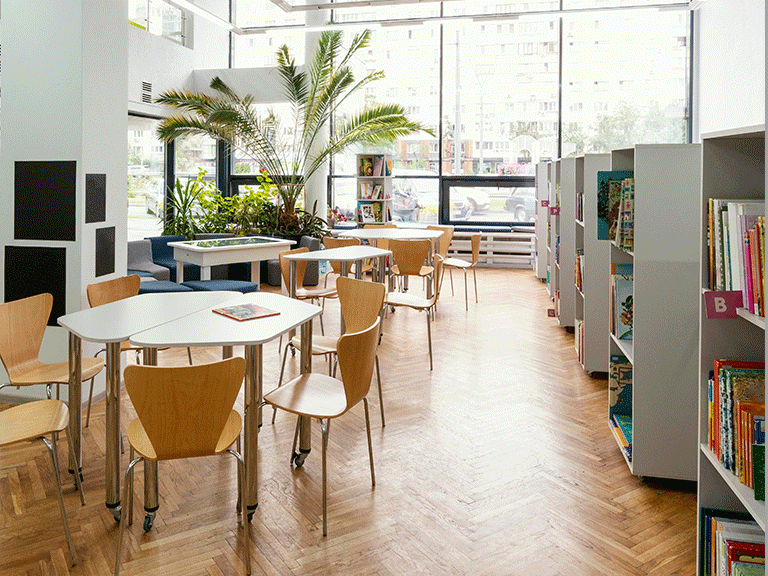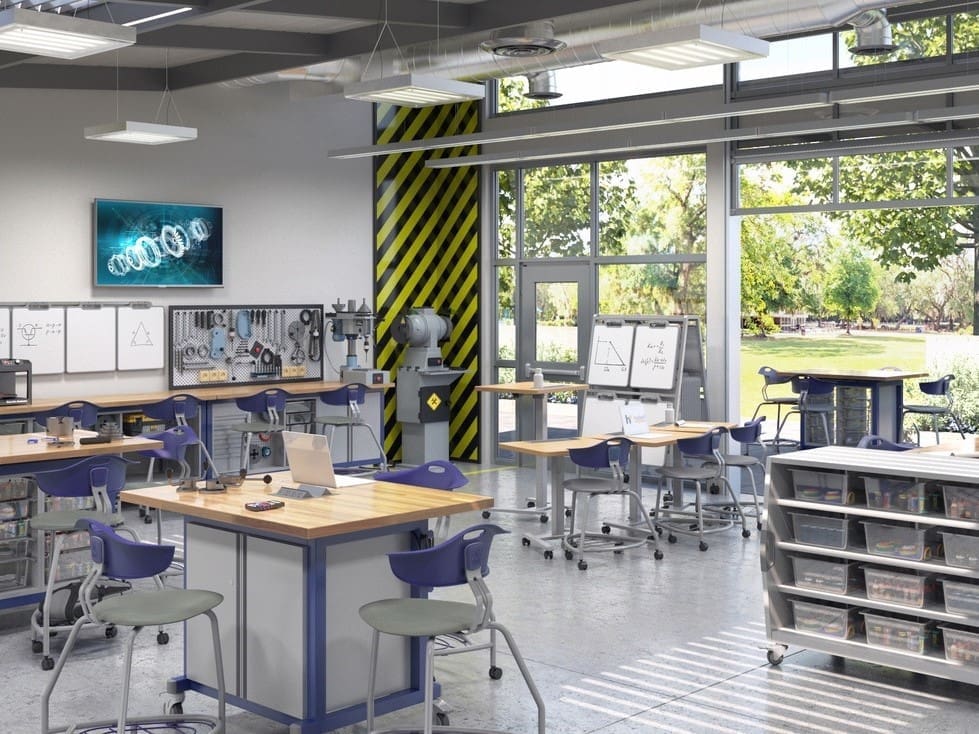The right higher education furniture can significantly enhance the learning experience, boost productivity, and ensure the well-being of both students and educators. As educational environments evolve to incorporate new teaching methods and technologies, so must the furniture that supports these activities. Here are ten essential pieces of higher education furniture in New Haven, CT, that every classroom needs to create a functional, comfortable, and dynamic learning space.
Creating an optimal learning environment involves selecting the right furniture to meet the diverse needs of students and educators. Here are ten essential pieces of higher education furniture every classroom should have.
Ergonomic chairs are a cornerstone of effective higher education furniture. The benefits of ergonomic seating extend beyond mere comfort. Prolonged sitting can lead to numerous health issues, including back pain, neck strain, and poor posture, which can detract from the learning experience.
Ergonomic chairs are designed to provide proper support, promoting better posture and reducing discomfort during long study sessions or lectures. When selecting ergonomic chairs for higher education furniture, several key features should be considered:
Adjustable desks are another vital component of higher education furniture. These desks offer the flexibility to switch between sitting and standing positions, catering to different student needs and promoting a healthier lifestyle. The ability to adjust desk height is particularly beneficial for accommodating students of various heights and those with disabilities, ensuring that everyone can learn comfortably.
Adjustable desks are designed to support various learning activities and adapt to different needs. When selecting adjustable desks, consider the following features:
Collaborative tables are essential for fostering interaction and teamwork among students. In higher education settings, group work is a common teaching method that encourages peer learning and the development of critical thinking skills. Collaborative tables are designed to support this type of interaction, providing ample space for students to work together comfortably.
Collaborative tables enhance group work and interaction in classrooms. Key features to look for include:
Mobile whiteboards are a versatile piece of higher education furniture that can significantly enhance teaching and learning dynamics. Unlike fixed whiteboards, mobile whiteboards can be moved around the classroom, allowing educators to adapt their teaching methods to various activities and student needs. This flexibility is particularly useful in interactive and participatory learning environments.
Mobile whiteboards offer flexibility and convenience for dynamic teaching environments. Consider these features:
Effective storage solutions are a crucial aspect of higher education furniture, helping to keep the classroom organized and clutter-free. A well-organized classroom not only looks better but also functions more efficiently, allowing students and teachers to focus on learning rather than searching for materials.
Storage solutions help maintain organization and efficiency in the classroom. Look for features such as:
In today’s digital age, technology-integrated furniture is becoming increasingly important in higher education. This type of furniture supports the use of digital tools and devices, enhancing the learning experience and preparing students for the modern workforce.
Technology-integrated furniture enhances connectivity and efficiency in the classroom. Key features include:
Comfortable lounge areas are an often-overlooked aspect of higher education furniture, but they play a crucial role in promoting mental well-being and fostering informal learning. These areas provide students with a space to relax, socialize, or engage in casual study sessions, contributing to a more balanced and supportive educational environment.
Lounge areas enhance student well-being and support informal learning. Features to consider include:
Lecture podiums are a vital piece of higher education furniture, providing instructors with a dedicated space to deliver their lectures and manage their materials. A well-designed podium can enhance the teaching experience, helping instructors stay organized and focused.
Lecture podiums support effective teaching and organization. Look for these features:
Modular seating is an innovative approach to higher education furniture, offering flexibility and customization to fit different teaching methods and classroom layouts. This type of seating can be easily rearranged to create various configurations, from traditional lecture setups to collaborative group arrangements.
Modular seating provides versatility and adaptability. Key features include:
Acoustic panels are a crucial but often overlooked component of higher education furniture. These panels are designed to improve sound quality in the classroom by reducing noise and echo, creating a more conducive learning environment.
Acoustic panels enhance the auditory experience in the classroom. Consider the following features:

While ergonomic furniture was initially designed to align with workplace needs to reduce the rate of work-related musculoskeletal disorders (WMSD), it has become a crucial component of higher education furniture, offering numerous benefits that enhance the learning experience for students and educators alike. Here are the key advantages:
Ergonomic furniture, such as chairs with lumbar support and adjustable desks, helps maintain proper posture. This reduces discomfort and prevents the long-term health issues often associated with prolonged sitting, which is common in higher education settings.
Studies show that ergonomic furniture can significantly impact work quality and productivity. In terms of higher education, comfortable and supportive higher education furniture allows students to concentrate better on their studies. When physical discomfort is minimized, students can maintain their focus for longer periods, leading to improved productivity and learning outcomes.
Ergonomic higher education furniture can contribute to a more engaging classroom environment. Students who are comfortable are more likely to participate actively in class discussions and activities, fostering a more dynamic and interactive learning experience.
Investing in ergonomic higher education furniture can significantly reduce the risk of musculoskeletal problems among students and educators. This can lead to fewer absences due to health issues, promoting a healthier learning environment.
Ergonomic furniture is designed to accommodate various body types and sizes. This inclusivity ensures that all students, regardless of their physical characteristics, have access to comfortable and supportive higher education furniture.
By prioritizing ergonomic higher education furniture, institutions can promote long-term health and well-being for their students. This investment not only enhances the current learning environment but also instills habits that benefit students beyond their academic careers.
Selecting the right higher education furniture in New Haven, CT, is crucial for creating a functional and engaging learning environment. Here are some key considerations to help you make the best choices:
Begin by assessing the specific needs of your classroom. Consider the size of the room, the number of students, and the types of activities that will take place. This will help you determine the types and quantities of higher education furniture required.
Comfort is essential for maintaining student focus and engagement. Choose efficient ergonomic office furniture that supports good posture and reduces strain. Look for chairs with adjustable features and desks that can accommodate different heights.
Classrooms today need to adapt to various teaching methods and learning activities. Opt for furniture that is flexible and versatile, such as adjustable desks, modular seating, and mobile whiteboards. This will allow you to reconfigure the classroom layout as needed.
With technology playing a significant role in education, it’s important to choose higher education furniture that supports digital learning. Desks with built-in charging stations, smartboards, and technology-integrated lecture podiums can enhance the learning experience.
Invest in high-quality, durable furniture that can withstand heavy use. This might have a higher upfront cost, but it will save money in the long run by reducing the need for frequent replacements.
Effective storage solutions are vital for keeping the classroom organized. Maximize storage space with options like cabinets, shelves, and mobile carts that can help maintain a clutter-free environment.
The appearance of your classroom can impact student morale and engagement. Select furniture that is not only functional but also aesthetically pleasing. Modern designs and vibrant colors can create an inviting learning space.
Get input from those who will use the furniture daily, including students and teachers. Their feedback can provide valuable insights into what will work best in the classroom setting.
While it’s important to invest in quality furniture, it’s also necessary to stay within budget. Look for cost-effective solutions that don’t compromise on comfort, flexibility, or durability.
Keep abreast of the latest trends in higher education furniture. Innovations such as sustainable materials and smart technologies can enhance the functionality and appeal of your classroom.

When choosing higher education furniture, prioritize materials known for their durability. Solid wood and metal frames are excellent choices for long-lasting support due to their sturdiness and resistance to wear and tear. High-pressure laminate (HPL) surfaces are resistant to scratches and stains, making them ideal for desks and tables as they maintain their appearance over time. Additionally, upholstery with performance fabrics can withstand heavy use and are easy to clean, ensuring the furniture remains in good condition and looks professional for many years.
Flexibility is key when accommodating various learning activities with your furniture choices. Opt for modular furniture that can be easily reconfigured to support activities ranging from lectures to group work. Collaborative tables, mobile whiteboards, and modular seating arrangements allow for quick and easy adjustments, making it simple to transition between different teaching styles and classroom needs.
Balancing cost and quality when purchasing higher education furniture involves looking beyond the initial price tag. While it might be tempting to opt for the cheapest options, investing in high-quality furniture can save money in the long run by reducing the need for frequent replacements. Look for reputable manufacturers that offer warranties and have a proven track record of durability and customer satisfaction.
Ergonomic furniture can significantly enhance classroom acoustics by incorporating features like acoustic panels that improve sound quality by reducing noise and echo. This creates a quieter, more focused learning environment, helping students hear and understand lessons better. Effective classroom acoustics are crucial for enhancing communication and minimizing distractions, leading to a more productive and engaging educational experience. Acoustic panels and sound-absorbing materials integrated into ergonomic furniture design play a pivotal role in achieving these benefits.
Ergonomic designs contribute to inclusivity by accommodating diverse physical needs, ensuring that all students can learn comfortably. Adjustable seating and desks allow students of various sizes and those with disabilities to find a comfortable and supportive position. This inclusivity fosters a supportive and equitable learning environment where all students can thrive, regardless of their physical abilities.
Transform your learning environment by choosing Stamford Office Furniture for all your high-quality higher education furniture needs in New Haven, CT. Known for our durable materials, Stamford Office Furniture offers a wide range of ergonomic and versatile furniture solutions tailored for educational settings. Whether you’re outfitting classrooms, lecture halls, or collaborative spaces, our products are designed to enhance student comfort and engagement.
Visit our showroom to explore our extensive collection and experience firsthand the superior quality and innovative designs that set Stamford Office Furniture apart.